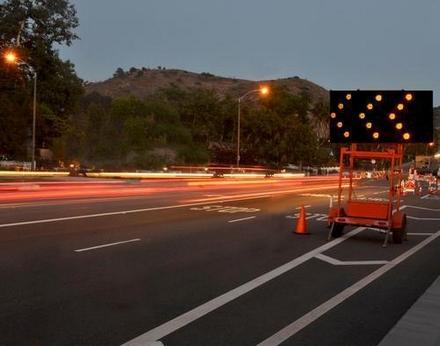TELEPHONES ANSWERED 24 HOURS A DAY
Speed Cameras and Construction Zones
 Many communities across the country utilize speed cameras to identify and fine those driving over the speed limit. The automated cameras use radar technology to catch speeding vehicles, capture the vehicle's license plate number, and a ticket is later sent to the driver. These types of cameras are also common at red lights, and are also used at rail crossings and toll stations.
Many communities across the country utilize speed cameras to identify and fine those driving over the speed limit. The automated cameras use radar technology to catch speeding vehicles, capture the vehicle's license plate number, and a ticket is later sent to the driver. These types of cameras are also common at red lights, and are also used at rail crossings and toll stations.
Cameras like this are hot button issues in many states. While penalties for being caught by an automated camera are typically lighter compared to those from traditional police stops, opponents argue that defense against tickets from automatic cameras is difficult, and that the technology is not always reliable. Proponents, however, say the cameras encourage drivers to obey all traffic rules while freeing up police resources for other purposes. Three states, Oregon, Illinois, and Maryland, use speed cameras at highway construction zones, hoping to increase worker safety and reduce the number of construction zone crashes. Do these cameras really help?
Increased Safety?
In Maryland, the state which most highly utilizes speed cameras near highway construction sites, over 2.3 million tickets have been issued to speeders in violating of reduced speeds near construction zones since the program’s adoption in 2010. State officials say the program is effective. In 2013, one percent of vehicles sped past Maryland cameras near highway construction sites. In 2015, the percent dropped to 0.5. Overall crashes in highway work zones also declined once the cameras were installed.
Proponents of the cameras say these are good signs, but others disagree. Crashes and deaths on American highways have declined over time without the use of speed cameras, thanks to better vehicle design and more widespread safety awareness. Opponents say that while states like Maryland may appear to be benefiting from the cameras near construction zones, there is nothing to indicate that the rates of of work zone crashes would not have declined without the cameras. Additionally, many view these cameras as a “money grab” attempt by states hoping to raise revenue.
The vice president of the National Motorists Association says there are other concerns with the cameras. Drivers are often surprised when they receive a citation in the mail, unaware that they were ever caught speeding. Citations typically take a week or longer to arrive, making defense against these types of tickets very difficult. Additionally, opponents question the reliability of the cameras. In some cases, the cameras have fined drivers who were not speeding. In one significant case involving an automated camera, a driver received a speeding ticket while they were stopped at a red light.
In Oregon, where construction zone cameras are utilized, authorities say they limit the use of the cameras as not to appear money hungry. Oregon law also requires that the state’s population be surveyed every two years on the use of speed camera technology, to ensure the majority of state citizens feel the technology is beneficial. This year, over 60 percent of poll respondents said they supported the cameras.
Speed Cameras in Illinois
While Illinois has utilized speed cameras near construction zones in the past, state officials appear to be shying away from the technology. Since implementing the cameras at construction sites, 4,000 citations have been issued, but none were sent out last year. The Illinois Department of Transportation says they are currently focusing on having a real police presence near construction sites, according to their spokeswoman. “Highly visible police presence in work zones reminds the public to slow down and move over for workers.”
Anytime an Illinois driver violates a construction area speed limit, they face increased consequences of caught. First time offenders face fines of up to $375. Additional offenses can increase to $1,000 fines and potential license suspension. Those charged with speeding in a construction area will also receive points on their driving record, which can significantly increase insurance rates. If you have received an unwarranted construction zone ticket, do not simply pay off the ticket. With the help of a qualified Chicago area construction zone ticket attorney, such as those at the Law Offices of Hal M. Garfinkel LLC, Chicago Criminal Defense Attorney, you can defend yourself. Call 312-629-0669 to schedule a free consultation with us immediately.
Sources:
http://www.wsj.com/articles/speed-camera-debate-ramps-up-1461024448
http://www.ghsa.org/html/stateinfo/laws/auto_enforce.html




